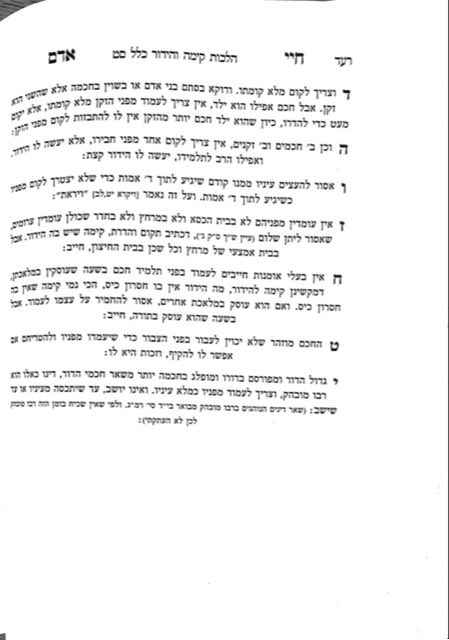We are discussing the halachos of kavod talmidei chachamim, specifically the halachos of hiddur. When one speaks to a talmid chacham, one must use whichever titles are most appropriate. As we learned (shiur 1493), anything which has become accepted as a vehicle for presenting kavod would be a part of this chiyuv of hiddur. If a person does not speak like that, it would be considered a lack of hiddur. For example, if the minhag in a specific place is to call people of statue for aliyos with the title harav, it would be a lack of hiddur to leave it out. In general, speech to a talmid chacham must be done appropriately.
We have learned that the halachos of a talmid chacham apply to a seivah as well, and the halachos of hiddur are no exception. Sometimes people get impatient with the elderly, but in the same way that one cannot speak to a talmid chacham with such language, they cannot speak to a seivah in such a manner either.
We learned that if one wishes to disagree with a rebbe or talmid chacham, they must do so in a respectful manner (shiur 1494). When it comes to kibud av v’eim, we learned that it is also inappropriate to deliberately state that one agrees with their parent, as it makes it seem as though the parent needs the child’s approbation. The same is true regarding a rebbe. If one agrees to their rebbe or talmid chacham, they are giving off the impression that they are giving an approbation to the rebbe or talmid chacham, which would be a lack of hiddur.
To take it a step further, if a talmid is within the presence of a rebbe, and is machmir on something the rebbe is meikil on, if the action of the talmid being more machmir can be interpreted as implying that the rebbe is doing something wrong, it would be a lack of hiddur to keep those chumros in front of one’s rebbe. Thus, for example, if a talmid is invited to their rebbe’s house for a meal, it would be a lack of hiddur to practice personal chumros. The Gemara in Bava Kamma discusses this point and concludes that it is assur even though the talmid is practicing his chumros to be careful about mitzvos. If the rebbe is not present, the issur does not apply.
There is an issur to be moreh halacha lifnei rabbo, to pasken halacha in the presence of one’s rebbe. This issur extends to a person of stature as well, even if they are not one’s personal rebbe, such as the rav of a shul or a rosh yeshiva. A rebbe can give reshus to a talmid to pasken, and there are details as to when this reshus works. Our minhag is that reshus works to allow someone else to pasken when the rebbe is not present. The halacha is different for a rebbe muvhak, but, as we have learned, it is uncommon for one to have a rebbe muvhak.
The Pri Megadim says that included in the issur of not paskening in the presence of a rebbe is that one should not pasken without looking in the sefer. He argues that seforim nowadays are like rabbeim, to a certain extent, since so much of our knowledge comes through them. Thus, before one paskens a halacha which has a specific chiddush from a specific sefer, they should double check the sefer before paskening.
Summary
The chiyuv of hiddur to a talmid chacham or seivah includes
- Speaking appropriately;
- Using the appropriate titles accepted by the local society;
- Not agreeing to them if it will appear as though one needed to give their approbation;
- Refraining from personal chumros not practiced by one’s rebbe, in the rebbe’s presence;
- The issur of moreh halacha lifnei rabbo, unless the rebbe is not present.



